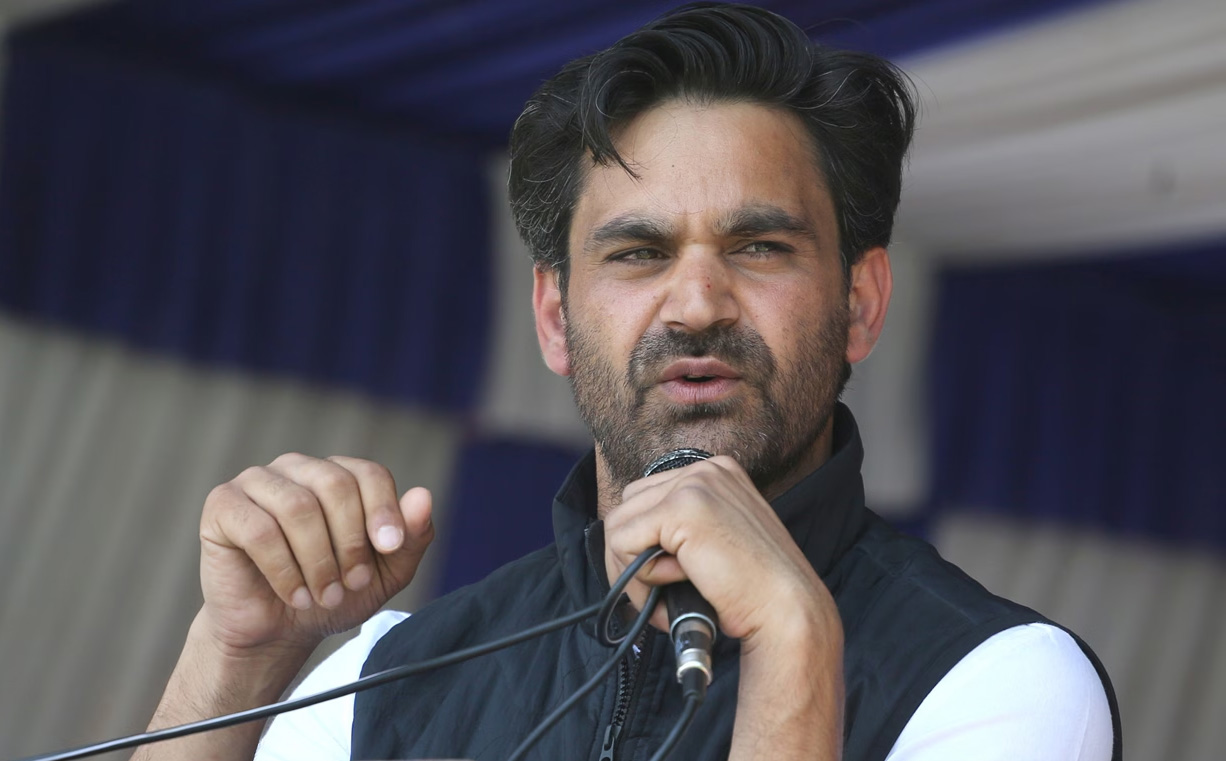Urdu in Kashmir: PDP Warns of Dangerous Communal Trend as BJP Celebrates Language Row Verdict
By: Javid Amin | Srinagar | 15 July 2025
As tensions in Jammu & Kashmir continue to rise over governance, memory, and democratic process, a new fault line has emerged—language.
The Peoples Democratic Party (PDP), in a strong statement on Tuesday, accused the Bharatiya Janata Party (BJP) of weaponizing language for communal gain, after the BJP celebrated a court decision removing Urdu as a mandatory qualification for the naib tehsildar (revenue officer) posts in J&K.
“Urdu is not a symbol of any religion but the throbbing pulse of Jammu Kashmir’s identity.”
— Waheed ur Rehman Para, PDP legislator
This controversy comes just days after the political firestorm over Martyrs’ Day, and amid heated exchanges over historical memory, democratic authority, and performance politics. The Urdu row adds a new layer to what is fast becoming a comprehensive cultural contest for Kashmir’s soul.
What Happened? Urdu Dropped from Revenue Exam Requirements
Urdu has long been a mandatory qualification for naib tehsildar positions, owing to its central role in land records, legal documentation, and revenue administration across J&K.
However, a recent ruling by the Central Administrative Tribunal (CAT) struck down the Urdu requirement, following a petition filed by candidates who claimed it was discriminatory.
While language-based petitions are not uncommon in Indian courts, what followed was telling: BJP leaders and their youth wing openly celebrated the verdict, calling it a “victory over linguistic imposition”, and staged a rally at Srinagar’s Lal Chowk.
This prompted outrage across sections of Kashmir’s civil society, with the PDP calling it a deliberate communal provocation.
PDP’s Sharp Response: Language Is Culture, Not Communal
In a detailed post on X, senior PDP leader Waheed ur Rehman Para voiced deep concern:
“BJP’s attempt to view Urdu through a communal lens marks a dangerous and disgraceful new low in our political discourse in J&K.”
Para emphasized that Urdu:
-
Is not confined to any religion—it is used by Hindus, Muslims, Sikhs, and Christians in Kashmir alike.
-
Is the administrative backbone of J&K’s governance history.
-
Carries the cultural and emotional resonance of Kashmir’s poets, freedom fighters, and historians.
“This is not just about a language; it is about erasing collective memory, undoing cultural continuity, and rupturing the social fabric,” he wrote.
The PDP sees this move as part of a larger cultural re-engineering project by the BJP—one that attempts to redraw Kashmir’s identity along communal and ideological lines.
Institutional Pressure? A Worrying Trend for Democracy
What makes the controversy more disturbing, Para argued, is the apparent influence of political pressure on judicial processes.
“The BJP’s protests appear to be shaping institutional responses. That’s alarming in any democracy.”
His statement points to a growing concern that central institutions are increasingly mirroring political ideology, especially in matters of culture, language, and local traditions.
Several legal experts have also raised eyebrows at the CAT’s ruling, noting that Urdu has a century-old legal status in Kashmir, and is still used in land, court, and police documentation. Removing it from basic qualifications could cripple revenue operations, they argue, and alienate officials from communities they are meant to serve.
Language as Identity: Why Urdu Matters in Kashmir
To outsiders, the debate may seem administrative. But in Kashmir, Urdu is much more than a language. It is:
-
The official language since the Dogra period, standardized through royal proclamations and administrative reforms.
-
The language of poets like Mahjoor, poets of resistance like Agha Shahid Ali, and judges of local courts.
-
A lingua franca that binds the multi-ethnic, multi-religious composition of the state—from Rajouri to Pulwama, from Kishtwar to Anantnag.
Stripping Urdu of official status or administrative relevance, therefore, is perceived not merely as reform, but as cultural violence—a move to disconnect Kashmiris from their heritage and institutions.
The BJP’s Stand: Breaking “Linguistic Bias”?
On the other side, the BJP maintains that its campaign was never communal. Rather, they claim:
-
Urdu posed an unfair barrier to non-Urdu-speaking aspirants from Jammu and Ladakh.
-
Revenue administration can function in Hindi or English, aligning with broader national policy.
-
The party is focused on “removing colonial-era relics”, and “making opportunities inclusive.”
A BJP youth leader at Lal Chowk said:
“We are celebrating justice. No one should be forced to learn a language for a government job in their own state.”
Yet, critics point out that this logic rarely applies in reverse—Hindi remains essential in many North Indian states, but is not viewed as discriminatory.
Cultural Identity Under Siege? Connecting the Dots
This controversy cannot be seen in isolation. It must be placed alongside a series of recent actions that appear to redefine Kashmir’s symbols, language, and legal heritage:
-
Scrapping of Martyrs’ Day as a public holiday.
-
Erasure of historical events from textbooks and calendars.
-
Celebration of Urdu’s removal as a victory against “old systems.”
Together, these moves reflect what some call “narrative engineering”—not just changing policies, but reshaping how people remember, speak, and belong.
And that’s what makes this battle over Urdu so significant: it is a battle over belonging.
Bottom-Line: Language as a Line of Control
In Kashmir, language has always been more than communication. It has been a bridge between people, a witness to pain, and a record of resistance.
The attempt to communalize Urdu strikes at the heart of what makes Kashmir a shared civilizational space—a region where identity has been forged through confluence, not conflict.
As PDP’s Waheed Para put it, “Urdu is the memory of a people who lived, suffered, and hoped together.”
Whether or not Urdu remains in official exams, the larger question looms: Will Kashmir be allowed to retain its pluralistic soul, or will it be reduced to ideological binaries?
In the current climate, this is no longer just a policy matter. It’s a cultural emergency.




